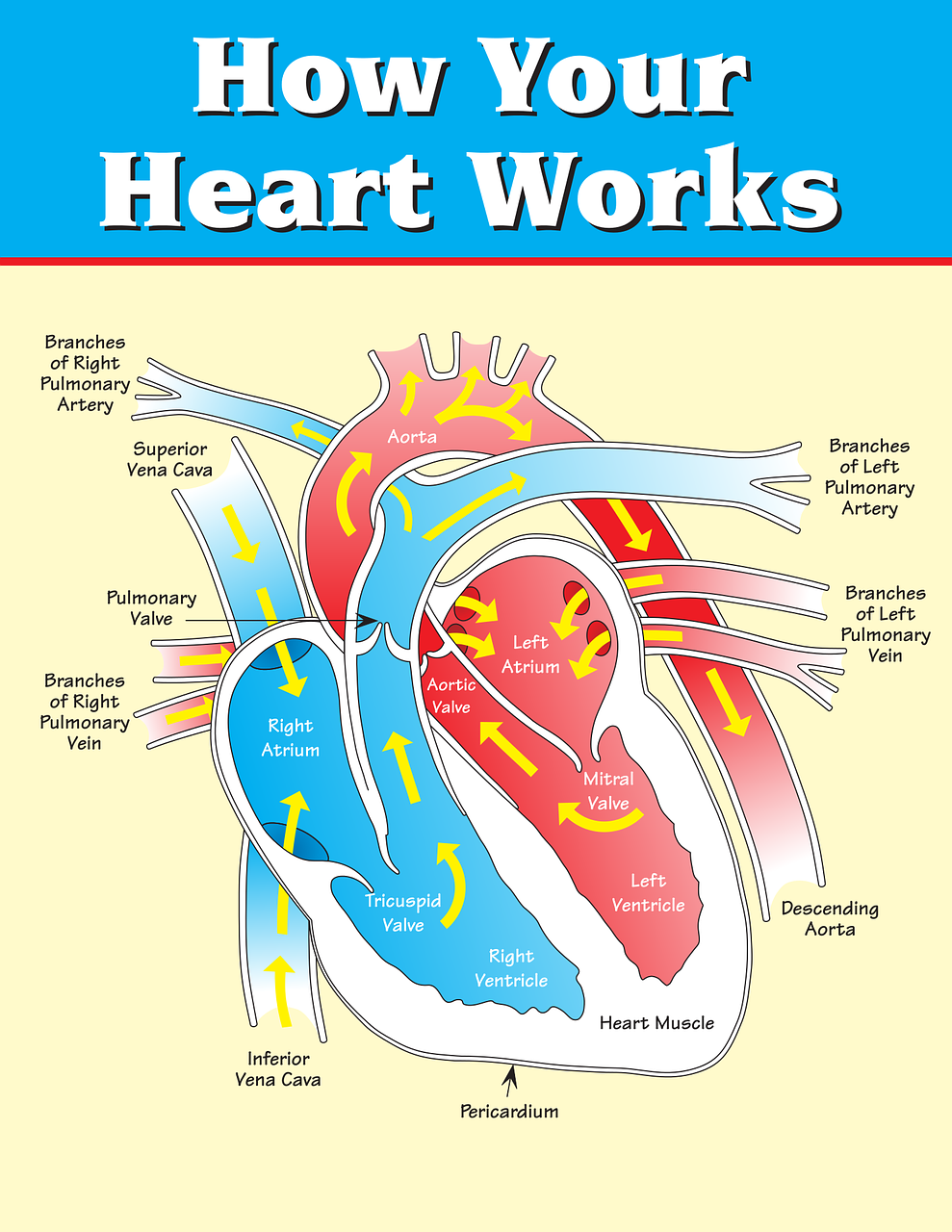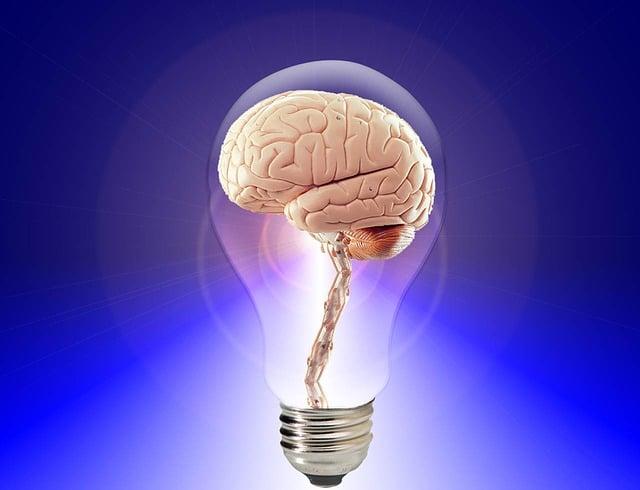Some people can't work out, so how do they keep their Brain, Body and Heart Healthy?
Well, there's actually lots you can do, from learning a new language or learning how to sing to keeping a food journal or learning how to swim. In fact, by eating a healthy diet, and getting enough high-quality sleep can also help keep stress levels in check.
"You know, all that really matters is that the people you love are happy and healthy. Everything else is just sprinkles on the sundae."
- Paul Walker

Let's Start With Your Heart
The heart is only second to the brain when it comes to its importance for our body's ability to survive and thrive in this world. The human heart works like a pump sending blood around your body to keep you alive. It's a muscle, about the size of your fist, in the middle of your chest as the heart beats, it pumps blood through a system of blood vessels, called the circulatory system.
The right side of the heart receives blood that is low in oxygen because most has been used up by the brain and body. It pumps this to your lungs, where it picks up a fresh supply of oxygen. The blood then returns to the left side of the heart, ready to be pumped back out to the brain and the rest of your body.

Let's take a quick look at some daily habits that will help keep your heart healthy:
- Laughing is not just good for the soul, but for the heart as well - Don’t just LOL in emails or Facebook posts. Laugh out loud in your daily life. Whether you like watching funny movies or cracking jokes with your friends, laughter may be good for your heart. According to the AHA, research suggests laughing can lower stress hormones, decrease inflammation in your arteries, and raise your levels of high-density lipoprotein (HLD), also known as “good cholesterol.”
- Stretching! - New research from the University of Milan in Italy showed that a 12-week stretching regimen improved blood flow, lowered blood pressure, and decreased the stiffness of arteries. Good blood flow leads to less damage to artery walls and may mean a lower risk of heart attacks and strokes.
- Enjoy that chocolate every now and then - Dark chocolate not only tastes delicious, but it also contains heart-healthy flavonoids. These compounds help reduce inflammation and lower your risk of heart disease, suggest scientists in the journal Nutrients. Eaten in moderation, dark chocolate (not oversweetened milk chocolate) can actually be good for you.
Keeping Your Brain Healthy

The brain is responsible for so many of our everyday functions, even for people with reduced motor skills it still controls things such as:
- Thoughts
- Memory
- Emotion
- Touch
- Sight
- Breathing
- Temperature
And that's just a few of the most notable, so it's only natural that we would want to do everything possible to take care of our brain health.
"I learned a few years ago that balance is the key to a happy and successful life, and a huge part of achieving that balance is to instill rituals into your everyday life a nutritious balanced diet, daily exercise, time for yourself through meditation, reading, journaling, yoga, daily reflection, and setting goals."
- Gretchen Bleiler
Let's take a quick look at some daily habits that will help keep your brain healthy:
- Take Care of Your Heart! - Believe it or not, taking care of your heart makes it easier for your brain to do its job. Once your heart supplies fresh oxygenated blood to your brain it can keep functioning as it needs to.
- Learning a Language is Soooo Good for Your Brain!:
- Learning a foreign language has been found to cause an increase in the size of the hippocampus and the cerebral cortex, the parts of your brain that are responsible for learning and memory.
- The term ‘grey matter’ refers to the area of the brain packed with nerve cells and fibres designed for processing information. Brain scans of bilingual individuals find denser grey matter within the brain’s left hemisphere, which is responsible for processing language and information. More grey matter indicates a healthier brain.
- Be a Social Butterfly! - Social interaction helps to ward off mental health complications such as depression and stress, both of which can contribute to memory loss. Take every opportunity to connect with loved ones and friends especially if you live alone. There is research that links solitary confinement to brain atrophy, so remaining socially active may have the opposite effect and strengthen the health of your brain, also it's fun!
The Importance of a Healthy Diet

A healthy, balanced diet is essential for our overall health and well-being, both physically and mentally. A well-balanced diet provides important vitamins, minerals, and nutrients to keep the body and mind strong and healthy. Eating well can also help ward off numerous diseases and health complications, help maintain healthy body weight, provide energy, allow better sleep, and improve brain function.
So, What Does a Balanced Diet Consist of?
Balanced nutrition or a healthy diet is when you consume the right amount of foods from each of the food groups (on the food pyramid).
The main nutrients you need to consume to maintain a healthy balanced diet are as follows:
- Water - Drinking enough water each day is crucial for many physical and mental health reasons.
- Carbohydrates - Carbohydrates provide the body with glucose, which is converted to energy used to support bodily functions and physical activity.
- Proteins - Every cell in the human body contains protein! You need protein in your diet to help your body repair cells and make new ones.
- Fats - A small amount of fat is an essential part of a healthy, balanced diet. Fat is a source of essential fatty acids, which the body cannot make itself, unsaturated fats help reduce the risk of heart disease and lower cholesterol levels.
- Fibre - There is strong evidence that eating plenty of fibre, will lower the risk of heart disease, stroke, type 2 diabetes and bowel cancer.
- Vitamins and Minerals - Vitamins and minerals are nutrients that the body needs to work properly. They boost the immune system, heal wounds and keep our bones and muscles healthy as well as numerous other behind-the-scenes little chores.

Tips for a Healthier Lifestyle
If you want to try some small changes for a healthier lifestyle why not start with some of the following:
Drink more water - Dehydration can really affect our mood but also our concentration levels. Nowadays there are apps out there and you don't even have to buy a smartwatch to use them. Apps like NutraCheck and FitBit allow you to set goals of how much water you would like to drink in the day, and they also allow set a reminder so you don't forget to drink water.
Don't fast for long periods of time - going too long between meals makes you feel tired and irritable this is because it causes a drop in blood sugars. (If you don't have time for a proper meal, snacks such as soups, smoothies, fruit, yoghurt or even nuts and seeds are great options to boost nutrition and energy levels.
Eat with others - Sharing meals when you can is so important for your social, emotional and mental well-being. It provides you with a chance to communicate with others it also allows us a chance to feel connected, to feel part of something.
Summarise with AI:















